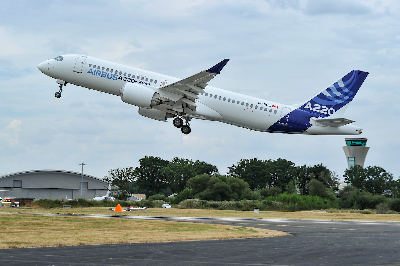
This article was written by Max Hardy.
With the beginning of the very first Green GB Week on Monday came an ambitious announcement by the Government – they’re seeking advice on when and how net zero greenhouse gas emissions can be achieved across the UK.
More generally, Green GB Week is aimed at highlighting the potential opportunities and benefits of environmentally friendly growth, and will help identify how industry and the public can contribute to this. Other Government announcements have included funding for several green projects such as innovative clean heating systems – but what does the week mean for the UK civil aerospace industry?
Transport is now the number one contributor of domestic greenhouse gas emissions in the UK, and although the vast majority of these are caused by road vehicles, aviation is still playing its part. This makes it clear that aviation, as well as other sectors, have to become cleaner. UK industry and its partners have been working extensively on green initiatives for some time now – with much of this work being visible at Farnborough International Airshow 2018.
Just some examples were Rolls-Royce’s ETOVL concept and their partnership with Cranfield University and Aston Martin on the Volante concept. Crucially, these concepts are based on technology that already exists or is currently in development – they’re not distant pipe dreams. The planned start of manufacture of the Airbus E-Fan X in 2019 also shows that aviation could be on the cusp of a green age. The E-Fan X, in partnership with Rolls-Royce and Siemens, is due to start flight trials by the end of 2020.
The projects above have shown that two things are crucial for encouraging a greener aviation industry – collaboration and Government support. Collaboration between industry partners can be the key to unlocking the strengths of wider industry when trying to overcome the challenges of adopting greener technologies. This means that SMEs can be as pivotal in the green initiative as industry primes.
Support from Government is also crucial in encouraging the adoption of environmentally-friendly technologies. A recent announcement for £10 million worth of funding included investment in the CAA to allow the regulator to build facilities for the testing of technology such as electric flying taxis. Looking forward, UK regulators will need to continually adapt to be able to maintain pace with industry to allow new, cleaner technologies to be implemented and developed in the UK.
It’s encouraging to see Government both investing and taking steps to prepare the UK for the adoption of green aviation. We hope this continues, helping nurture the aerospace industry’s innovation and development of environmentally-friendly technologies.
And while Green GB week is a great opportunity to highlight both what’s being done and what could be done to become a greener sector, it’s important not to limit this to one week a year. Both industry and the Government need to work towards this goal together, regardless of what week it is.





